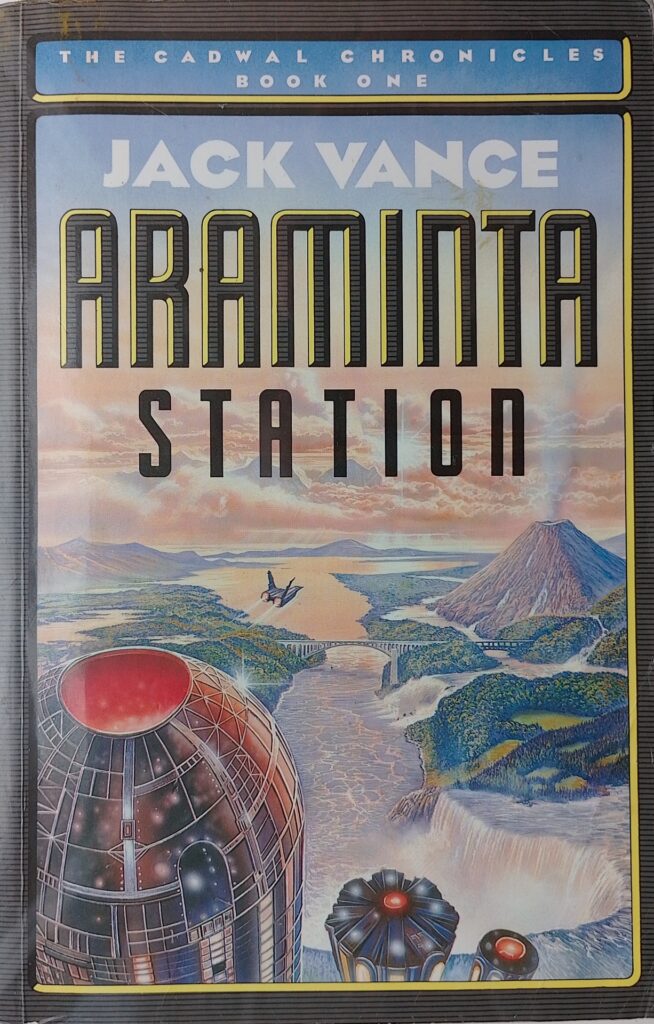First published 1988. New English Library paperback, 1988, pp 480, c.185,000 words.
This is book one of ‘The Cadwal Chronicles’ and by the last page there are more loose ends than in a big bowl of spaghetti. It is a great sprawl of a book which leaves the impression that Vance didn’t bother to plot out a story but just started with an idea and let the writing flow with whatever came into his head. As a consequence it is a very uneven read. What was he trying to write: a murder mystery, a police procedural, a thriller, a love story, a rumination on politics, utopias and dis-utopias, a paean to feudalism, an attack on feminism? All these things pass by and are mixed in a random melange.
It’s a pity because Vance strings sentences together in a readable fashion, although occasionally his dialog is clunky and there is far too much tell. For at least three invented planets we are given lessons that encompass geography, history, botany and more. Yet strangely, all these planets are very Earth-like, with just a slight rearrangement of the landmasses and seas. There is very little that is imaginatively alien, with the minor exception of a few strange creatures, but even these don’t stretch things very far.
The society that the teenage protagonist, Glawen Clattuc, inhabits at Araminta Station is not only feudal but racist and patriarchal. It comes across as a warped New England, where a few old families dominate, people dress for dinner, and young men belong to fraternities such as ‘The Bold Lions’. Women may run the house but men do the serious outside jobs. There are servants, called ‘Yips’, who are sub-human, looked down on, lusted after, feared, unreliable, dishonest and are supposed to be confined to a remote atoll, except when required for manual labour. The criminal-justice system is out of the Wild West where ‘Bureau B’ officers act as police, judges and executioners. It is all rather repellent.
The planet on which the station is placed was designated as being a nature reserve some nine-hundred years before the book begins. The population is supposed to be limited to that required to manage the reserve and conduct scientific research. It is not a democracy. The initiating action is the sudden disappearance of Glawen’s girlfriend. Bureau B investigates in a rather cack-handed manner and then seems to lose interest in the case. Life moves on. Glawen gets interested in another girl. There are some get togethers in which groups of teenagers discuss politics, philosophy and the arts like thirty-year-olds. Not much happens for a long time then, about sixty pages before the end, there is a sudden rush of action as Glawen investigates another mystery. At one point he visits a monastery on a different planet that espouses equality between the sexes to the point where even the adherents don’t know what sex they are. Glawen’s masculinity lights a few fires. It is made clear that this institution is utterly evil with full medieval gothic castle nightmare accoutrements, and therefore equality between the sexes must be a bad thing. That is not the only horror scene.
Technology is very 1980s with the exception of faster-than-light travel and communications. Also small aeroplanes (‘flyers’) have fully automatic pilots. However, taxis have drivers, people write letters to each other and use fixed-line telephones (no mobiles). All the measurement units are archaic British imperial.
It seems as though the book has not been closely edited; for example: the names of the days of the week are explained twice [p16 and p62], and a creature called a ‘Yoot’ is first encountered on the main landmass [p68], but later we are told it is ‘peculiar to the Lutwen Islands’ [p246].
Had I first read this as a teenager I might have enjoyed it; not spotting its flaws. Unfortunately they are now so blindingly obvious that they remove any pleasure from what might have been an engaging escapist fantasy.
Wikipedia biography of Vance: https://en.wikipedia.org/wiki/Jack_Vance
Wikipedia summary of the book: https://en.wikipedia.org/wiki/Araminta_Station
Others’ reviews of the book: https://www.goodreads.com/book/show/40892.Araminta_Station?from_search=true&from_srp=true&qid=BpzFDR1MJc&rank=1
© William John Graham, February 2024

